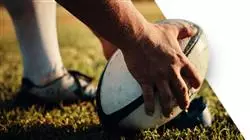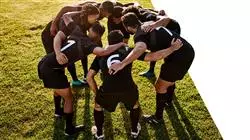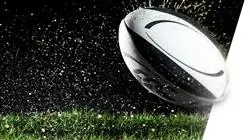University certificate
Scientific endorser

The world's largest faculty of sports science”
Why study at TECH?
Examine the most common pathologies in Rugby and help prevent them thanks to this Postgraduate diploma"

If there is one thing that characterizes Rugby, it is its high physical intensity and high level of contact. This causes a large number of injuries, so physiotherapeutic activity plays a significant role in treating and preventing them through the evaluation of posture, movement and training technique. But there is one pathology that is characteristic of Professional Rugby above all others: Concussion. It is important to have a thorough knowledge of this lesion in order to act appropriately.
In this sense, this program will not only focus on physiotherapy applied to this sport, but will also explore the nutritional and psychological facet so that the student will become an expert in the key elements for the welfare of the professional player. To do so, it will analyze in depth common injuries such as spine and head trauma or lower limb injuries, as well as establishing the basics for recognizing a Concussion. It will also cover the basics of Rugby player's body composition to assess their nutritional needs and will delve into the design of individualized psychological intervention plans.
Undoubtedly, a highly comprehensive specialization that will add luster to the student's curriculum and will allow him/her to study it comfortably wherever and whenever he/she wants. All you need is a device with Internet access to take your career a step further and benefit from a modern-day academic opportunity. In fact, TECH will give you the baton to manage your own academic deadlines at your convenience. To this end, it will have an extensive digital catalog of resources on Physiotherapy, Nutrition and Psychology applied to Rugby available 24 hours a day on the Online Campus.
Become an expert in recognizing concussions in Rugby players to act in time"
This Postgraduate diploma in Physiotherapy, Nutrition and Psychology Applied to Rugby contains the most complete and up-to-date scientific program on the market. The most important features include:
- The development of case studies presented by experts in Physiotherapy, Nutrition and Psychology Applied to Rugby
- The graphic, schematic and eminently practical contents of the book provide sporting and practical information on those disciplines that are essential for professional practice
- Practical exercises where self-assessment can be used to improve learning
- Its special emphasis on innovative methodologies
- Theoretical lessons, questions to the expert, debate forums on controversial topics, and individual reflection assignments
- Content that is accessible from any fixed or portable device with an Internet connection
Hone your skills by designing specific psychological intervention plans for each player by analyzing videos, interactive diagrams and master classes"
The program’s teaching staff includes professionals from sector who contribute their work experience to this educational program, as well as renowned specialists from leading societies and prestigious universities.
Its multimedia content, developed with the latest educational technology, will provide the professional with situated and contextual learning, i.e., a simulated environment that will provide an immersive education programmed to learn in real situations.
The design of this program focuses on Problem-Based Learning, by means of which the professional must try to solve the different professional practice situations that are presented throughout the academic course. For this purpose, the student will be assisted by an innovative interactive video system created by renowned experts.
It analyzes in depth the sports supplementation in each Rugby modality to increase the performance of the players"

Enroll now to handle the most innovative tools that exist today in sports coaching, such as the META or SWOT model"
Syllabus
The syllabus of this Postgraduate diploma clearly positions it in front of other programs by having the most comprehensive and updated vision of Physiotherapy, Nutrition and Psychology Applied to Rugby that the student will find in the market. In fact, each and every one of those enrolled will be immersed in an individualized academic itinerary that uses Relearning as a methodological substrate. This means that they will effectively internalize the concepts in a repeated and directed manner using interactive resources. They will thus enjoy a much more natural educational cycle.

Sign up now to benefit from the most comprehensive and updated vision of Physiotherapy, Nutrition and Psychology Applied to Rugby in the market"
Module 1. Injury Prevention Physiotherapy and
1.1. Sports Physiotherapy
1.1.1. Sport Physiotherapy
1.1.2. Field service
1.1.3. Security and assistance
1.2. First Aid
1.2.1. First assistance
1.2.2. Airway
1.2.3. Basic Principles of Cardioplegia
1.3. Most common pathologies in Rugby
1.3.1. Spine and head trauma
1.3.2. Upper Limb
1.3.3. Lower Limb
1.4. Concussion: Recognize and remove
1.4.1. What is concussion?
1.4.2. How to recognize a concussion?
1.4.3. Progressive return to play
1.5. Readaptation to gambling
1.5.1. Return to the post-injury game
1.5.2. Load control
1.5.3. Interdisciplinary collaboration and return to the game
1.6. Injury Prevention
1.6.1. Preseason
1.6.2. Self-care and healthy habits
1.6.3. Proprioception, cognitive work and spatial control
1.7. Preparation and field service: Minuto a minuto
1.7.1. Pre-game Organization, management and specific work
1.7.2. Field service
1.7.3. Care and protection
1.8. Post-match and recovery
1.8.1. Postpartum: care and recovery
1.8.2. Individual work and self-care
1.8.3. Collective work and rest
1.9. Control and follow-up: Medical management of equipment
1.9.1. Medical control in a professional team
1.9.2. Player baseline status check
1.9.3. Treatments, injury monitoring and recovery
1.10. Medical equipment
1.10.1. Basic medical equipment and material management
1.10.2. Medical devices: management and storage
1.10.3. Material organization and control
Module 2. Sports nutrition applied to Rugby
2.1. Physiological basis for Rugby nutrition
2.1.1. Macronutrients
2.1.2. Digestion and Absorption of Nutrients
2.1.3. Energy Balance
2.2. Metabolism and Energy Pathways in Rugby
2.2.1. Phosphagen pathway (ATP)
2.2.2. Glycolysis
2.2.3. Fatty acid oxidation
2.3. Body composition in Rugby (XV and 7)
2.3.1. Body composition in Rugby XV forwards
2.3.2. Body composition in Rugby XV three-quarter rugby players
2.3.3. Body composition in Rugby 7's players
2.4. Anthropometry in professional rugby teams
2.4.1. Body Composition Estimate Methods
2.4.2. Methods of estimating body composition
2.4.3. Differences between Rugby XV and VII
2.5. Nutritional periodization in Rugby XV
2.5.1. Pre-season and post-season
2.5.2. In-season and game week planning
2.5.3. Planning during period of injury
2.6. Nutrition for body composition change
2.6.1. Fat loss
2.6.2. Increased muscle mass
2.6.3. Body recomposition
2.7. Nutritional periodization in Rugby 7
2.7.1. Rugby 7's preseason
2.7.2. Rugby 7's tournament week
2.7.3. Postseason
2.8. Sports supplementation in Rugby (XV and 7)
2.8.1. Supplements evidence group A
2.8.2. Supplements evidence group B and C
2.8.3. Supplements not allowed
2.9. Nutrition during Rugby matches/tournaments (XV and 7)
2.9.1. Provisions during Rugby XV matches
2.9.2. Post-match recovery
2.9.3. Pre-competition carbohydrate loading
2.10. Nutritional advice to professional rugby players/teams
2.10.1. Goal setting and dietary interview
2.10.2. Development of team guidelines
2.10.3. Elaboration of a personalized nutritional plan
Module 3. Applied Psychology
3.1. Psychology and Sports Coaching
3.1.1. Important Aspects
3.1.2. The importance of psychology in sports
3.1.3. The role of the sports psychologist / coach
3.2. Psychological preparation for sport and physical activity: Rugby schools
3.2.1. Sport, health and psychology
3.2.2. Intervention with coaches and families of young athletes
3.2.3. Advice on the relationship between athletes, families and sports coaches: the importance of education in values in sport
3.3. Counseling and psychological techniques for sportsmen and women: training the future elite
3.3.1. Optimization of the Athlete's Learning and Search for Consistency in their Performance
3.3.2. Psychological intervention with young athletes and the transition to professional sport
3.3.3. Talent Management
3.4. Psychological intervention in competitive sport: sports elite
3.4.1. Optimal level of activation and emotional management in sports practice
3.4.2. Stress and Anxiety Intervention
3.4.3. Locus of control of the elite athlete
3.5. Psychological variables in sports performance
3.5.1. Positive and emotional psychology
3.5.2. Self-confidence and self-concept in the athlete
3.5.3. Athlete's Personality
3.6. Individual and group intervention in sports coaching: planning and implementation of a psychological program
3.6.1. Psychological intervention techniques
3.6.2. Design of individualized intervention plans
3.6.3. Design of intervention plans in the teams
3.7. Tools in sports coaching: GOAL, SWOT and Wheel of Life
3.7.1. META Model
3.7.2. SWOT Analysis
3.7.3. Wheel of life
3.8. Burnout in the athlete
3.8.1. Symptoms of the syndrome
3.8.2. Actions with the athlete
3.8.3. Prevention of new cases
3.9. Health and emotional well-being of the athlete
3.9.1. Effects of overtraining
3.9.2. Psychological implications of sports injury prevention and recovery
3.9.3. Flow
3.10. Withdrawal from sporting activities
3.10.1. Transition from elite sport and return to normalcy
3.10.2. Redefining the athlete's identity
3.10.3. New roles acquired

Enjoy a much more natural and dynamic academic cycle using the educational innovations that TECH makes available to you on the Virtual Campus”
Postgraduate Diploma in Physiotherapy, Nutrition and Psychology Applied to Rugby
Rugby, one of the sports with the greatest impact and popularity today, requires highly specialized professionals to meet the needs of players in terms of their physical and mental health. At TECH Global University, we understand the importance of having a multidisciplinary team of experts in physiotherapy, nutrition and psychology applied to rugby, which is why we have developed the Postgraduate Diploma in these areas to provide comprehensive and updated training to professionals interested in this field. Our Postgraduate Diploma program in Physiotherapy, Nutrition and Psychology Applied to Rugby offers high quality virtual classes, taught by qualified teachers in the field, allowing students to acquire updated and relevant knowledge for the care of rugby players. This program focuses on rugby-specific injury management, proper nutritional planning and monitoring for players, and psychological strategies for optimal performance on the field of play.
Become a rugby expert
The benefits of our postgraduate course are manifold. Students will obtain cutting-edge training in the areas of physiotherapy, nutrition and psychology applied to rugby, which will allow them to stand out in the labor field and be part of the team of professionals specialized in the comprehensive care of rugby players. In addition, being virtual classes, students can access the content from anywhere and adapt their study schedule to their personal and professional needs, which gives them flexibility and convenience in their educational process. TECH Global University is an institution recognized for its academic excellence and commitment to the formation of highly trained professionals. Our Postgraduate Diploma program in Physiotherapy, Nutrition and Psychology Applied to Rugby is a unique opportunity for those professionals interested in specializing in the care of rugby players and contributing to the development of this exciting sport.







